(Reading Time: 25 min Approx)
Searching For the Plot
Note of the Director Mr. Raj Banerjee to the Readers: “I made the film ‘Paarh: The Riverbank’ to speak for Humanity; To speak for those people, who lost their everything by the river erosion in the whole World.”
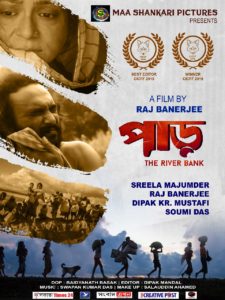
A sound of reverberating water woke up Raj from his slumber. When he went outside to wash his hands at the nearby tap, the dark clouds in the sky didn’t fail to catch his eyes. Words of Kedar Mandal kept echoing into his mind – “Remember, to take your right side and run as fast as you can…”. Raj rubbed his eyes and tried to see the room in the minimal light of the hurricane lamp. The room is spacious with only a khatiya (A bed knitted with ropes) and a little table present.
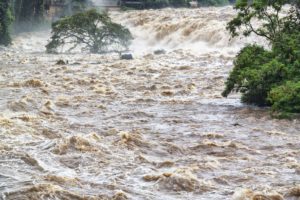
In that minimal light what he saw, made drops of sweat appear on his forehead. A rush of cold wind ran down Raj’s spine. Rainwater was licking from the ceiling with an enormous amount of water flowing inside from the main door.
The time has come!!!
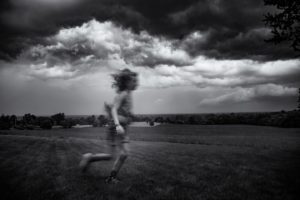 Kedar Mondal was right. Without wasting a single more second Raj jumped from his bed. The water level inside has already reached beyond his foot. He grabbed his satchel and rushed towards the door. There wasn’t enough time to pick up the rucksack. All his clothes and daily usable are inside it. But life costs more.
Kedar Mondal was right. Without wasting a single more second Raj jumped from his bed. The water level inside has already reached beyond his foot. He grabbed his satchel and rushed towards the door. There wasn’t enough time to pick up the rucksack. All his clothes and daily usable are inside it. But life costs more.
As he opened the door a huge thunderstorm broke into the room. Raindrops started to pierce his skin. It was pitch black outside, he could only hear the howling of the rain and wind accompanying the rage of the Ganges. Adventure can be good but too much of it can schedule life risk. Raj was adamant but he thought to himself was it really a safe decision? Will he ever see his wife again? Will he survive?
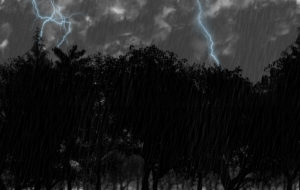 With a sudden lightning and sky cracking sound the half of the roof of the house collapsed within a second. Now Raj is fully aware that he is standing between a life or death situation. He reached to his pocket and took out his handset. There was hardly any signal but at least he can use the torchlight in it. As he switched on the torch light on his handset, the first beam of light captured a huge chunk of soil smashed and washed away by the roaring waves of the Ganges.
With a sudden lightning and sky cracking sound the half of the roof of the house collapsed within a second. Now Raj is fully aware that he is standing between a life or death situation. He reached to his pocket and took out his handset. There was hardly any signal but at least he can use the torchlight in it. As he switched on the torch light on his handset, the first beam of light captured a huge chunk of soil smashed and washed away by the roaring waves of the Ganges.
There is no time to waste now! He must run! He must run as fast as he can! Otherwise, the next wave will engulf him too. Fighting with the flooded river in this high tide will be a mockery to life for a non-swimmer like him. With the next strike of the lightning, the Ganges could witness an average height, stout physique, adventurous man running for his life following the Paarh (Riverbank) of the river. Every wave was rushing towards Raj as if Mother Ganges was very furious on her disobedient child and she must punish him for not listening to his well-wisher. As Raj was about to reach the end of the riverbank the largest coconut tree behind him fell in the water. He was panting, perspiring in this cold night but couldn’t stop; not even to catch a breath, as it might become his last.
Raj said to himself – “You see Raj? There? That’s the light of Kedar da’s house. You can make it. A few steps more…”
Kedar Mondal was asleep when his front door woke him up receiving huge bangs on it. It took him a few second to configure what is going on. Hearing the thunderstorm, he quickly got back to his senses, ‘Oh God, that can be Raj!’ He sprang off the bed and sprinted down the stairs. As he opened the door, he found Raj lying on his entrance. His eyes were closed but he is alive. He somehow saved his life and Kedar Mondal heaved a sigh of relief.
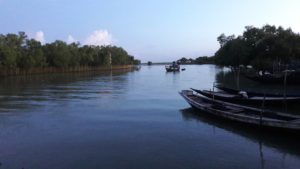
Panchanandapur is a little riverside village residing near the Farakka Barrage. The molecular attraction of the soil here is so low that it results to soil erosion during flood. The villagers are often compelled to shift their houses every year after monsoon leaves their village. But their faith and respect on Ganges still remains unshaken; they never stop referring her as their mother. Kedar Mondal is the President of the ‘Ganga Bachao Committee’ (Save the Ganges Committee). Though Ganges took a lot from him, but he says he can never repay the essence of livelihood and sustenance that Ganges never stops to offer. She is like a strict but deeply loving mother.
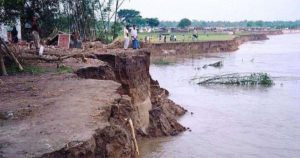
“How are you feeling now?” – Kedar Mondal asked Raj as he was sipping a cup of hot tea. “I should have listened to you then…but trust me I had no idea that it will take such a turn.” – Raj fumbled as the shock of the incident still resided inside him. “How are you all living like this?” – He asked Kedar Mondal. Kedar da smiled a bit and said – “Mother Ganges took over my house 10 times. What you went through tonight, we, the people of Panchanandapur go through it every monsoon and now we have become used to the damages.”
Kedar Mondal warned Raj on the very moment when he asked to stay on the house near the riverbank. Though the house belongs to Kedar Mondal, but he hardly stays there. Houses near riverbank belongs to high alert area. Every year around hundreds of people lose their roof over head because of the flood. “You don’t understand! It’s not safe to stay there, Raj.” – Kedar Mondal repeated this over and over again. But Raj was adamant. He was interested in the adventure; he was looking for thrill.
Being a one storied house near the riverbank of Ganges, it made Raj feel refreshed. He wondered – “How can one not live here?” He went to nearby tap and washed his hands. It was almost evening. The bus ride from Malda to Panchanandapur made him very tired. After finishing the dinner, Raj went to bed, much earlier than his normal schedule in Kolkata. Struggling to get comfortable on the Khatiya (Bed made of coconut ropes); he couldn’t remember when he fell asleep. He was glad that he woke up due to the sound of thunder. He should’ve listened to Kedar da, he thought sitting in Kedar da’s simple yet cosy house.
It was almost dawn and the rain seemed to calm down after a terrific night of thunderstorm. “Let’s go! You need to witness the reality of our tumultuous life.” – Kedar da got up to go for a walk. The tea made him get back to his senses. Raj felt like, he has received a new life. They stepped out and saw groups of people were sobbing and collecting their belongings floating on the river edge. They need to gather them if they still possess an intact appearance.
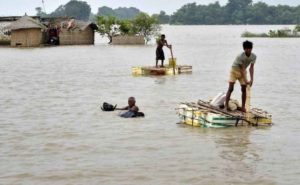 The trails of last night, was scattered all over the riverbank. Raj walked close to the end of the riverbank. He was curious and frightened at the same time. He had no idea what was coming next! Something caught Raj’s eyes and he couldn’t speak anymore. The house he stayed in last night is no longer there. All he could see is that tap where he washed his hands. He couldn’t believe his own eyes…what would have happened if he hasn’t woken up last night? His body might have been washed off with the tides too.
The trails of last night, was scattered all over the riverbank. Raj walked close to the end of the riverbank. He was curious and frightened at the same time. He had no idea what was coming next! Something caught Raj’s eyes and he couldn’t speak anymore. The house he stayed in last night is no longer there. All he could see is that tap where he washed his hands. He couldn’t believe his own eyes…what would have happened if he hasn’t woken up last night? His body might have been washed off with the tides too.
Kedar Mondal read his mind. He spoke in a soft voice – “I hope you can now understand the relevancy and necessity of your mission that you have just undertaken. If you could speak for the people here, voice their suppressed cry; Panchanandapur will be forever grateful to you. I must go and help my people now. You can wait here or take rest at my house if you feel like.
Raj was tired but how can he sleep in peace after witnessing the helplessness of the people of Panchanandapur in front of the natural calamity. As a creative person himself, he must try on his own way to make these people’s voices heard!
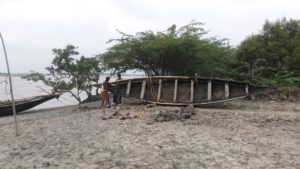
“Very few people in this world get the chance to recognise their purpose of life and fulfil it too. I am telling you Raj; you should go to Panchanandapur. What if you find exactly what you are looking for?” – those were the very words that his conscience uttered into Raj’s ears before coming here. He had no idea that his state of dilemma will push him to a cause worthy to fight for.
Looking at the indefinite horizon and vast Ganges, Raj remembered how he wanted to be a filmmaker. But his aim was to voice for the oppressed, to portray the reality and struggle of the helpless. That is why, when he read the Sunday newspaper last week about the flood in Bihar the whole idea appeared on his mind. So far, he has worked for Telefilms and daily soaps. But he realised it’s high time he should pursue his long-wished dream – The dream to be a Filmmaker.
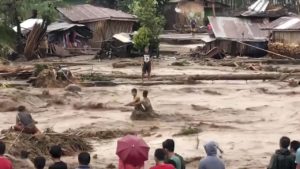 Raj sat on the wet riverbank. His hands and feet were stained with mud. He had no idea life will take such an innovative turn before coming here. They say good things come to those who wait…something exactly like that happened to Raj. He wouldn’t have dug deep into this matter if Naimuddin didn’t appear in one sunny morning.
Raj sat on the wet riverbank. His hands and feet were stained with mud. He had no idea life will take such an innovative turn before coming here. They say good things come to those who wait…something exactly like that happened to Raj. He wouldn’t have dug deep into this matter if Naimuddin didn’t appear in one sunny morning.
Raj was waiting near the local bus stop just when, he heard a long-time known voice from behind. He turned around and Naimuddin was there, smiling just like he did in their college days. They have been the closest friend but somehow the fast pace of life made them lose contact to each other. “Hi, buddy! You haven’t changed a bit” – Raj said with a happy face. Naimuddin smiled even bigger and replied – “It’s been so long. How are you my friend?” When old friends meet time feels inadequate as there’s so much to talk about. With two cups of bharer cha (Tea served in cups made of clay) they went on and on with how life was to how life is now! With every other talk of his life, Raj didn’t hesitate to share his interest on – River erosion in Bengal. Naimuddin noticed that curiosity on his face and advised him to visit two people, who can might be able to help. They were Sunanda Bandapadhyay and Kalyan Rudra, two well-accomplished Potamologists (One who studies Rivers).
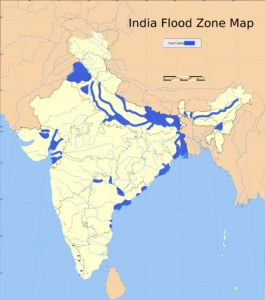
After meeting Sunanda Bandapadhyay in person and discussing with him about the problems of soil erosion and flood near the villages of Ganges, Raj couldn’t stop but digging more on this matter. Mr. Bandapadhyay showed him the theatrical data of life loss and damages caused by flood in Ganges. As per Sunanda da’s words and deep knowledge on this matter Raj came to know that –
The Ganges forms one of the major river systems in India. From the Gangotri Glacier, it traverses a distance of 2,525 km to the Bay of Bengal. The river carries millions of tonnes of sediment load and deposits it in the plains. The sediment deposition creates many severe problems like the decrease of river depth.
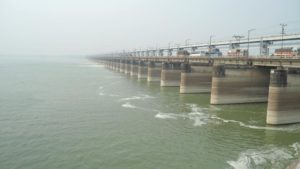 The Ganges is a meandering river and Farakka Barrage has disrupted the dynamic equilibrium of the river and hindered the natural oscillation of the river within its meandering belt, which is about 10 km wide in Malda and Murshidabad districts. The river has a general tendency to shift towards the left bank upstream of the Farakka Barrage and towards the downstream below the Farakka Barrage. River bank failure is because of certain factors like soil stratification of the river bank, presence of hard rocky area (Rajmahal), high load of sediment, difficulty of dredging and construction of Farakka Barrage as an obstruction to the natural river flow. The rivers in Murshidabad district have been continuously changing their meandering-geometry actively since second half of the twentieth century but the dimension of river bank erosion has been increased after construction of Farakka Barrage. More than 200 sqr. km of fertile land was completely wiped out till 2004 in Malda district. As of 2004, the Ganges had eroded 356 sqr. km of fertile land and displaced around 80,000 people in the period 1988 – 1994, in Murshidabad district.
The Ganges is a meandering river and Farakka Barrage has disrupted the dynamic equilibrium of the river and hindered the natural oscillation of the river within its meandering belt, which is about 10 km wide in Malda and Murshidabad districts. The river has a general tendency to shift towards the left bank upstream of the Farakka Barrage and towards the downstream below the Farakka Barrage. River bank failure is because of certain factors like soil stratification of the river bank, presence of hard rocky area (Rajmahal), high load of sediment, difficulty of dredging and construction of Farakka Barrage as an obstruction to the natural river flow. The rivers in Murshidabad district have been continuously changing their meandering-geometry actively since second half of the twentieth century but the dimension of river bank erosion has been increased after construction of Farakka Barrage. More than 200 sqr. km of fertile land was completely wiped out till 2004 in Malda district. As of 2004, the Ganges had eroded 356 sqr. km of fertile land and displaced around 80,000 people in the period 1988 – 1994, in Murshidabad district.
As Raj expressed his interest in showcasing the grim lifestyle of these people through his film, Sunanda advised him to see Kedar Mondal, the man who is working tirelessly for this noble cause; whose soul aim is to deliver his people from getting devoured by the rage of Ganges.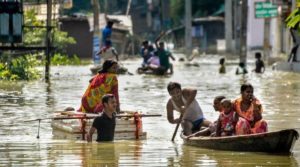
With hope in his heart and courage in his veins, Raj came to Malda yesterday morning to reach Panchanandapur. But as he asked the bus drivers for a ride to this village none of them agreed to help. Though it seemed rude at first but after midnight Raj now finally understands, why people choose to avoid this village. Who wants to lose their life being helpless in front of natural disasters!
Unable to find any other way out when he called Kedar da, surprisingly within half an hour he got a bus going to Panchanandapur. But the driver strictly made it clear that they’re going to drop him on the main road. After that he will be on his own. He could guess the kind of power and hold Kedar Mondal has in this village and even outside it as well.
Being a man of such stature and owner of so much influential power, Raj was surprised to see him waiting at the bus stop with two umbrellas – one for himself and the other for Raj – in a simple Fotua and Dhoti. As he reached his house, his family and the people of the village didn’t spare a single chance to greet him as their own.

Raj felt lucky and sad at the same time. He realised how these people know more about humanity than the autocrats and so-called intellectuals residing in city. They prepared their best dishes just for him. There was Bhuna Khichudi (Rice fired with spices) served with Aloor dum (Potato curry – an Indian Delicacy). The plate was decorated with 5 types of fries including – Pumpkin, Eggplant, Spinach, Potato, Cauliflower. The daal (whole grain curry) made of Kalai grains tasted like home to Raj. For the first time he tasted a delicacy, named by the villagers Kakrar Jhal (Spicy crab curry). He was felt overwhelmed by their hospitality.
Raj thought to himself, these people don’t even know him, but they welcomed him as if he is one of their own. They made him realise that humanity is the sole asset, upon which we often forgot to rely on these days.
No! He has not lost his hope on humanity. He will speak for them! He must speak for them! It is his duty as a filmmaker towards his society, towards the world. He wants his family to be proud of him; he wants to make himself proud. He gazed at the water. The sound of the river waves meant something.
As if, they were saying – “Go ahead Raj! These people need you. You need them. We all need each other to survive in this harsh, cruel world. Speak for Humanity! Speak for your people!”
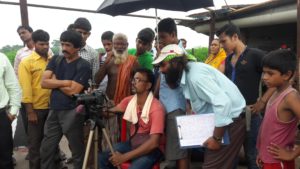


Interesting, would like to more of the Ganges in chapter -02
Sitting alone inside the office quarters in Delhi well away from home at Mumbai due to the Covid scare lockdown
I could really feel what it means for the hapless people living across the Ganges
As I started reading, I could visualize as if I was caught beneath the raging floods
Got so involved in it.
Is the Farakka barrage one of the causes for such devastation by the Ganges?
Or is it a result of natural occurrence!
Warm Regards
Suresh Iyer